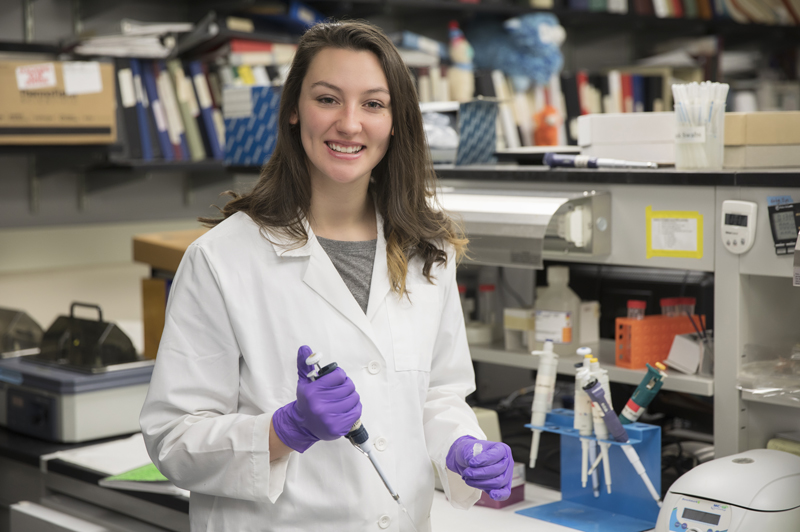Biomedical anthropology spotlight: Alexis Lagoy
Master's student cites faculty emphasis on research, closeness of classmates

Among Alexis Lagoy’s classmates in her graduate-level classes are future doctors, physician assistants, forensic examiners and teachers.
Their common thread? Earning a master’s degree in biomedical anthropology.
“It’s a very forgiving program, so you’re able to pick and choose the direction you want to go,” Lagoy, a native of Baldwsinville, N.Y., near Syracuse, said. “We get to learn about human body systems, and how cultural aspects of humans can result in different diseases.”
The opportunity to learn how human biology and culture interplay drew Lagoy to the biomedical anthropology 3+2 accelerated program while completing her undergraduate degree in anthropology.
The program allows students to earn their master’s degree in biomedical anthropology in one year after completing some graduate coursework during their senior year.
According to Lagoy, many students view the program as a unique stepping-stone into their field of choice.
“Pretty much anybody who is interested in pursuing a medical profession, this is a great degree to learn more about human medicine,” Lagoy said. “Some people use this program to teach too. Biomedical anthropology is an up-and-coming discipline, and you can take classes on how to teach anthropology.”
For Lagoy, the program was the best way to study what she loves most.
“I’ve always been really interested in forensics, like ‘Law & Order SVU,’ all those shows. And I’ve also always been interested in biology, so when I came here, I was thinking about doing a biology degree, but didn’t want to have to do all the chem,” Lagoy said. “I care about human biology, and that’s basically what biological anthropology is — and it involves not only the biological aspects, but the cultural aspects.”
Lagoy has been able to deep dive into her interest in forensics through her connections with the Anthropology Department. This past summer, she completed an internship with Elizabeth DiGangi, assistant professor of anthropology, in her forensics lab.
Through her internship, Lagoy learned hands-on skills, such as proper methods and etiquette in a forensics lab.
“Also, the connections I’m making with the professors and the other students in the program are also going to be beneficial getting a job down the line,” Lagoy said.
She credited the willingness of the Anthropology Department’s faculty to involve their students in research as a strength of the program.
“They provide you with a lot of opportunities to study underrepresented people and the medical problems we’re seeing in these countries that are becoming more modern,” Lagoy said. “That’s one of the biggest aspects of research that they’re doing, and they always involve the grad students.”
Faculty support of students goes as far as the director of the biomedical anthropology graduate program, Gary James.
“Dr. James knows the program through and through. I’ll go to him all the time for class help — for any of my classes, he’s super helpful. For scheduling too,” Lagoy said.
Since most of the faculty teach both undergraduate and graduate courses, Lagoy said she has been able to form long-lasting relationships with them. She said these connections, along with the rigor of her undergraduate coursework, have allowed her to smoothly transition into graduate-level work.
The same is true of her connections with her classmates in the program.
“A lot of them, we did undergrad together and went into the 3+2 program together,” Lagoy said. “We’re all in it together, we all work together on homework, we all study together. It’s really cool.”
When she’s not involved in research or classwork, Lagoy is a member and second-year captain of the varsity volleyball team. She is also a Special Olympics volunteer with her teammates.
“I was really fortunate to have five years on the varsity volleyball team,” Lagoy said. “I’m a very structured person now and I know how to time manage a lot more because of it.”
After graduating in May, Lagoy plans to build a career in forensic research, forensic anthropology or forensic pathology. She hopes to work with local police departments on forensic cases while pursuing another master’s in forensic science or a PhD in anthropology.
“I definitely want to pursue my education,” she said. “I love learning.”
In the meantime, however, Lagoy feels lucky to be in a program so diverse, and so cutting-edge.
“I recommend it to all of my friends,” she said. “Anyone who says, ‘I don’t know what I want to do!’ I’m like: ‘Do this.’”
